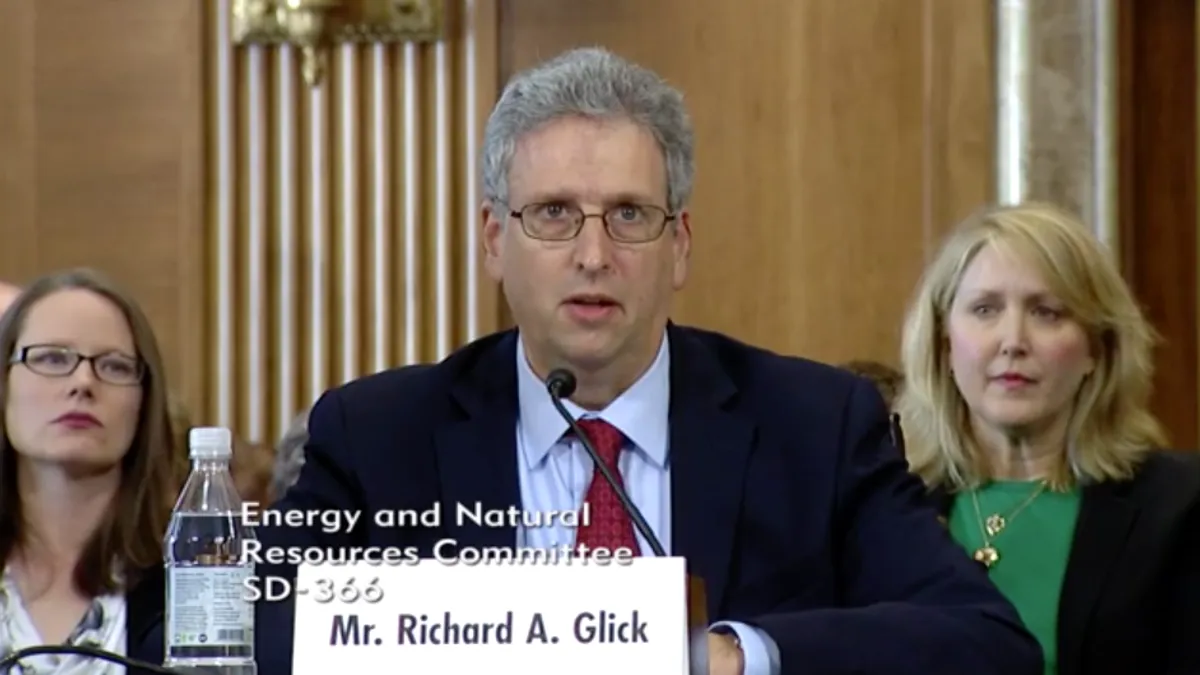Dive Brief:
-
Federal Energy Regulatory Commissioner Richard Glick on Monday predicted a return to the debate over coal and nuclear compensation at FERC, telling a Washington audience, "I don't think the issue is dead."
-
With an emergency bailout reportedly on hold at the White House, "a lot of the focus is returning to FERC" on grid resilience issues, Glick said. FERC Chairman Neil Chatterjee will determine the direction of its resilience docket, but Glick said he is "not entirely sure where the chairman wants to go with that proceeding yet."
-
Glick's comments came one day before the swearing-in of incoming Commissioner Bernard McNamee, who helped craft a coal and nuclear bailout proposal at the Department of Energy that FERC unanimously rejected in January. Glick told Utility Dive he has not yet spoken about policy with the new regulator and declined to weigh in on mounting calls for McNamee to recuse himself from the resilience docket.
Dive Insight:
Glick's comments on Monday illustrate how the specter of a federal bailout for uneconomic coal and nuclear plants has hung over Washington throughout the year.
In January, FERC unanimously rejected a proposal from the DOE to provide cost recovery to plants with onsite fuel, opening a longer term proceeding on grid resilience. The White House responded in June with a directive to DOE to find another way to save the plants, but that plan is reportedly on hold within the administration.
If that continues, Glick said bailout backers are likely to redirect their attention back to his commission.
"I think there are still people out there that want to do something and if it's not through the DOE, it has to be through FERC," Glick told Utility Dive on the sidelines of an event hosted by Asian Americans in Energy, the Environment and Commerce. "In our resilience proceeding, it's up to the chairman to decide where he wants to go next, but I don't have any inside information about where he wants to go. I just worry about it."
It's not the first time Glick, a Democrat, has noted a lack of communication with the chairman's office. In August, he told Utility Dive he had no knowledge about whether FERC was working with the White House on a coal bailout, nor was he given notice about a series of controversial public appearances made by FERC's chief of staff.
The commissioner has, however, had some dialogue with McNamee already, but said it did not extend much beyond pleasantries.
"He stopped by once. He seems to be a very pleasant person," Glick said. "The only conversation I had with him is I showed him around the office and we talked about what it was like on a daily basis, but we haven't talked substance at all, which is important when you're up for confirmation."
Congressional Democrats and some energy lawyers say McNamee should recuse himself from the resilience docket due to his role in crafting the DOE proposal that sparked its creation. McNamee, however, has declined recusal to this point — a debate Glick was keen to avoid.
"Every commissioner has to make their own decisions," he said. "I recused myself from some proceedings where I thought I had a conflict."
Instead, the commissioner put the focus back on Chatterjee.
"I think it's up to the chairman to decide how he wants to proceed on [resilience]," Glick said. "Commissioner McNamee will have a vote but my concern [with the docket] was before they ever nominated commissioner McNamee."
FERC's last open meeting of the year is scheduled for Dec. 20, and the commission has a number of pending issues alongside the resilience docket, like the rewrite of PJM's capacity market rules and an open pipeline policy review. Without giving any specifics, Glick predicted a busy agenda to end 2018.
"I think there's going to be a lot of orders," he said.














